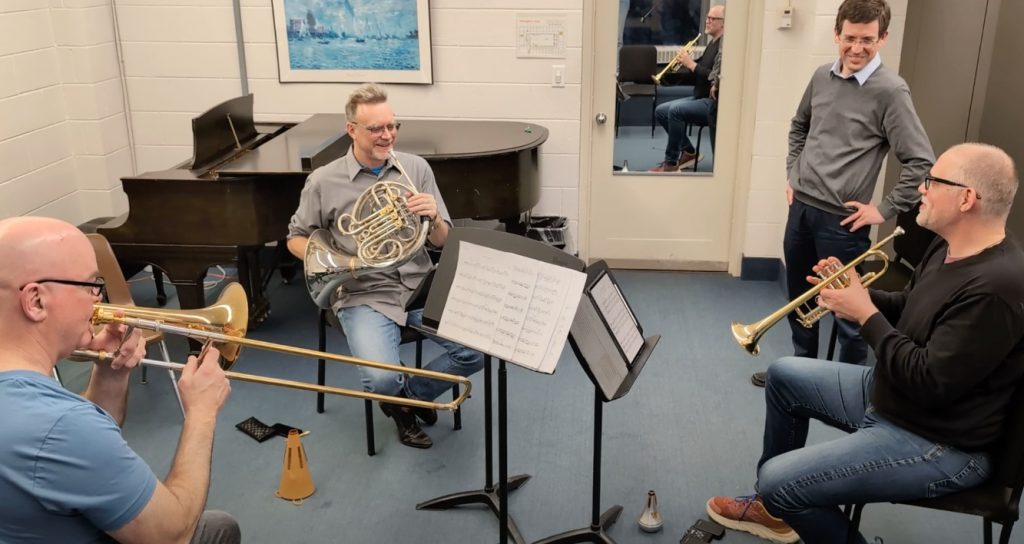by Kevin McLaughlin

Before the trio took the stage, a handful of instrumental and vocal performers drew welcome attention to non-brass works by Nicholas Puin, Matthew C. Saunders, Margaret Brouwer, and Andy Junttonen.
Puin’s earnest bassoon quartet Six Reasons Why tosses around six musical themes — some slow, some active, but always in the darker timbral regions of the instrument — among the players. Lydia Byndas, Louis Rispoli, Sierra Stewart, and Renee Strong blended well and projected solo lines even through the thickest matrix of sound.
Saunders’ five Short Psalms for contralto and piano were tenderly sung by Heidi Skok, adroitly accompanied by Randall Fusco. Maybe because of the low tessitura of Skok’s voice and her prevailing downcast gaze, these songs of praise and joy seemed a little cheerless, though this may have been the subversive point.
Brouwer’s easygoing Clarinet Sonata received a deft reading by Ben Chen and pianist Mio Arai. Flaunting established clarinet attributes, the first movement conjured Brahms — in an amorous mood — and the second, a young Peter out to catch his wolf.
Charles Reneker and Hunter Wirt, two skilled percussionists studying at CIM, gave a compelling performance of Junttonen’s one day these chains will break away. Inspired by Chantel Belfon’s poem Invisible Chains, the piece uses actual chains to beat — or rather, scrape — across surfaces. The performance evoked images of forced marching, inexorable and brutal, increasing in intensity to the end.
Factory Seconds’ mini recital, which made up the second half, provided further opportunity to hear fresh new works, all written specifically for them by members of the Composers Guild.
Minute for Seconds was both a play on the trio’s name and an effective fanfare by Saunders. It worked well as a short, idiomatic call-to-places, and despite its economic forces managed to evoke a larger, more fulsome ensemble.
The Seconds were joined by an equally formidable source of sonic energy, pianist Christina Dahl, for Margi Griebling-Haigh’s Quatour Royal. Each movement is a delightful, fairytale-like personification of face cards in an imaginary deck of playing cards. French titles sparked the imagination with four courtly affects — boastfulness, arrogance, graciousness, and triumph — as guides. The third movement, a lullaby written for the group’s regular hornist Jesse McCormick’s newborn baby girl, was tender and nostalgic, with judicious use of mutes — so as not to wake anybody.
James Wilding’s The Pyramid mirrors its architectural namesake by manipulating durations and repetitions of phrases. For all of its mathematical description, it holds the ear well with rhythmically interesting, attractive, slightly spiky language.
Trio Suite, by Ryan Charles Ramer, captures in sound the phenomenon of petit-mal seizures, illustrated in music by brief episodes of dissonance. Two Baroque-recalling fugues are separated by mostly tonal and calm — apart from the convulsions — interludes.
Tripartita, a well-developed work in four movements by Sebastian Birch, was a variety pack of fanfares, promenades, and ragtime — each preceded by a short prelude — and kept both the longhair and middlebrow listener attentive.
Pictured: composer James Wilding and the Factory Seconds Brass Trio in rehearsal
Published on ClevelandClassical.com April 30, 2024
Click here for a printable copy of this article


